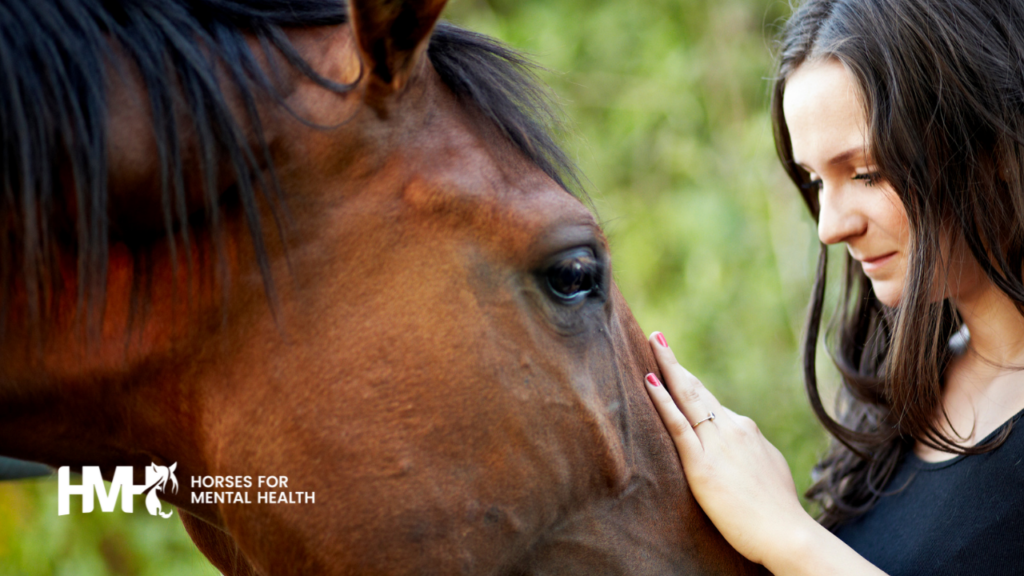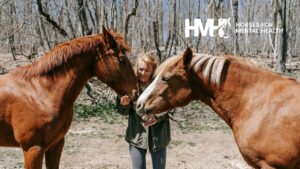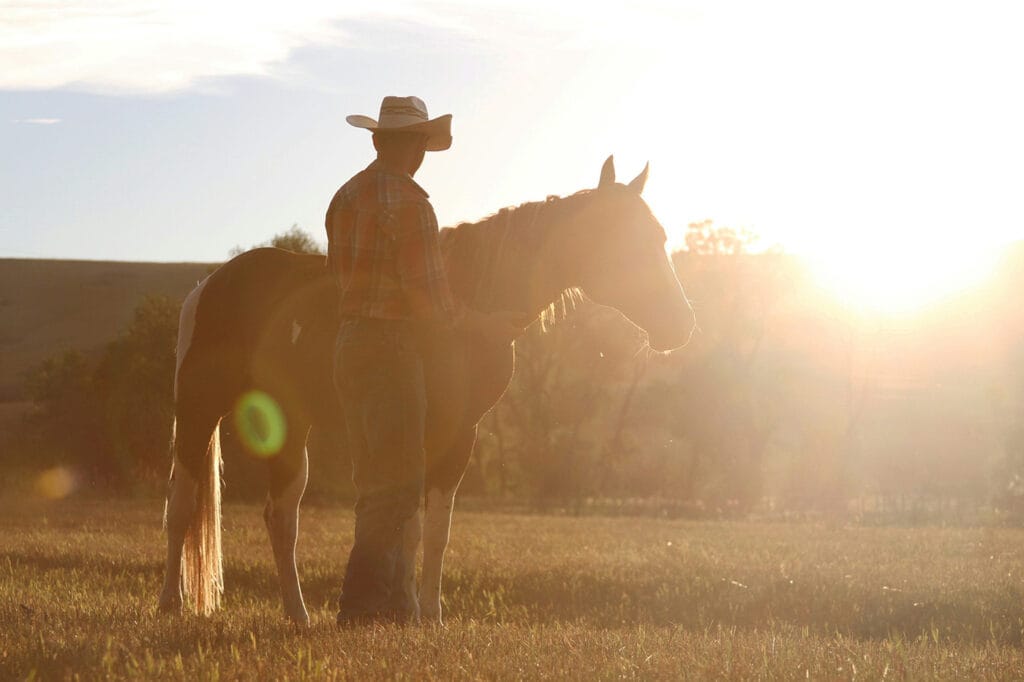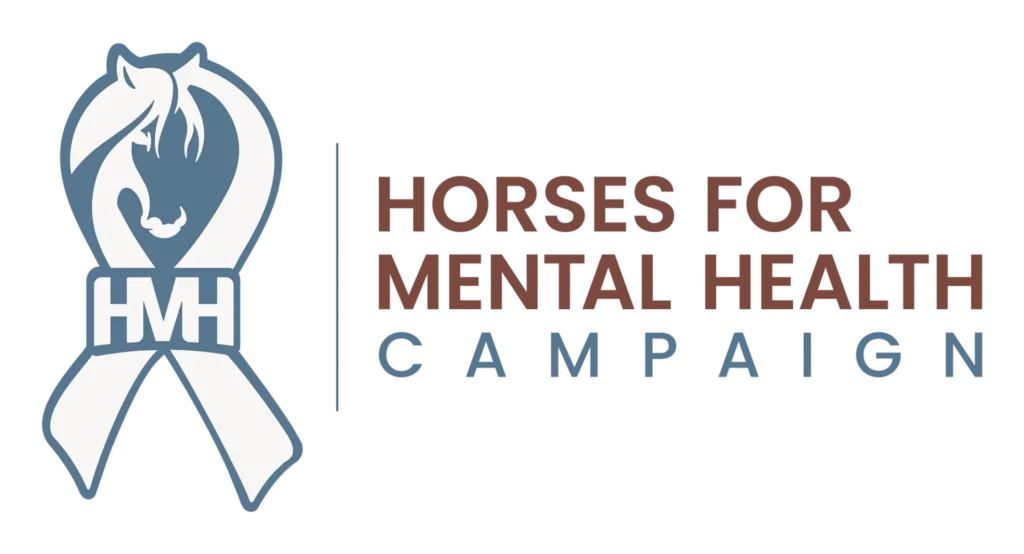Losing a child to suicide is a pain no parent should ever have to endure. For one mother, the loss was compounded by the unbearable weight of guilt and regret. Her daughter, once vibrant and full of life, had spiraled into the depths of depression and suicidal thoughts. She did everything she could—she sought help, brought her daughter to psychotherapy sessions, and tried to be the supportive anchor her daughter needed.
One evening, a heated argument erupted between them. Emotions ran high, and in the heat of the moment, they gave each other 30 minutes to let things cool down. But when 31 minutes passed, the unthinkable happened. Her daughter died by suicide. At that moment, the mother’s world shattered. Anger, guilt, and overwhelming sorrow took hold.
In the midst of her grief, the mother found herself at a mental health program involving horses—a place she never imagined would help her find the peace she so desperately sought. It was there she met a horse named Rebel. Unlike the other horses, Rebel always kept his distance, stepping back every time the mother tried to approach. The space between them was a painful reminder of the emotional and physical distance she had felt with her daughter in those final days.
But one day, something extraordinary happened. During a session, the mother was overcome with deep grief, missing her daughter. There was a great distance between her and Rebel, just like the emotional and physical distance between her and her daughter. Overcome with emotion, she curled up on the ground and began sobbing.
Rebel did something unexpected. Slowly and quietly, he walked over to her and pressed his head against her body. At that moment, she looked up, her tears falling freely, and whispered, “You haven’t left me,” as though speaking directly to her daughter. For the first time in what felt like an eternity, a sense of peace washed over her. In Rebel’s gentle gesture, she felt her daughter’s forgiveness and connection.
This powerful story is a testament to the profound healing power that horses can offer. Through her journey with Rebel, this mother discovered a path to healing. It’s a reminder that even in our darkest moments, healing is possible.
We invite you to watch the animated video of this story and witness the incredible bond between humans and horses and the ripple effect of suicide. It’s a story of love, loss, and ultimately, forgiveness. Join us in exploring how the quiet strength of a horse can lead to profound emotional breakthroughs and healing.
The Ripple Effect of Suicide
Suicide is a tragic loss, not only for the individual but also for their loved ones. The ripple effects of suicide can be felt for generations, leaving a lasting impact on families, friends, and communities. It’s essential to acknowledge the pain experienced by those affected by suicide and to offer support and compassion.
It’s essential to remember that survivors of suicide, caregivers of loved ones living with suicidal ideation, and families left behind by loved ones lost to suicide are not alone. They need support, understanding, and compassion from loved ones and the community. It is a difficult thing to process and some need extra support.
Who Does Suicide Affect?
- The Individual Living With Suicidal Ideation Or Has Died By Suicide: It’s important to remember that the individual experiencing suicidal thoughts is also profoundly affected by the ripple effect. For many, the struggle with mental health can last for years, filled with deep emotional pain and a growing sense of hopelessness. These individuals endure immense suffering, often believing they are a burden to others, which can lead them to view suicide as the only escape.
- Family Members: They may wrestle with guilt, wondering if they missed signs or could have done something to prevent the tragedy. The loss of a child, sibling, parent, or partner can lead to complicated grief, depression, and even suicidal thoughts in those left behind.
- Friends and Peers: Friends may feel a profound sense of loss and struggle to process the sudden absence of someone they care about. Peer groups, particularly among young people, can be deeply affected, sometimes leading to what is known as “suicide contagion,” where the risk of suicide increases among those who were close to the person who died.
- Communities: Schools, workplaces, and neighborhoods can experience collective grief and a sense of vulnerability. The death of one individual by suicide can lead to increased awareness and discussion about mental health but also can create a climate of fear and sadness.
Support for Those Living with Suicidal Ideation
If you are experiencing suicidal thoughts, it’s important to know that you are not alone, even if it might feel that way. Suicidal ideation can make you feel isolated and overwhelmed, but there are people who care deeply about your well-being and are eager to provide the support you need.
Suicidal thoughts or ideation involve thinking about, considering, or planning suicide. These thoughts can vary greatly in intensity and duration, affecting each person differently. Recognizing that these thoughts are a symptom of deeper issues, rather than a reflection of your character or value as a person, is crucial. They often stem from situations that feel insurmountable, but with the right support and interventions, these feelings and the situations causing them can be managed.
Solutions for Those Struggling
- Seek Immediate Help: If you feel overwhelmed by suicidal thoughts, contact a mental health professional or reach out to a free and confidential suicide prevention hotline immediately (text or call 988). These services are there to provide support and can offer immediate coping strategies.
- Talk to Someone: Whether it’s a trusted friend, family member, or therapist, talking about what you’re going through can provide relief and is often the first step toward healing. Simply sharing your feelings can reduce the burden and help you feel less isolated.
- Psychotherapy Involving Horses: Engaging with horses in a safe space offers a unique and powerful way to address difficult emotions and mental health challenges. Horses are naturally intuitive herd animals and can provide a calming and nonjudgmental presence. This type of therapy, which often takes place in a peaceful outdoor setting, can help you form connections, build trust, and improve emotional regulation.
Supporting Caregivers of Loved Ones Who Are Living with Suicidal Thoughts
Caring for someone with suicidal thoughts is an act of immense compassion and courage. As a caregiver, you’re often the first line of defense against crisis, which can be both a privilege and a profound challenge. It’s normal to feel overwhelmed, anxious, or even depressed about your loved one’s struggles. These feelings do not diminish the love and care you provide; they simply mean you are human. You are doing a profoundly important job, and it’s okay to acknowledge the emotional strain and seek support for yourself.
It’s important to give yourself the same kindness and understanding you offer your loved one. Remember, taking care of yourself isn’t just beneficial for you—it’s also beneficial for the person you’re supporting.
Ways to Care for Your Mental Health:
- Lean on Your Community: Connect with others who are in similar situations. Support groups can provide understanding, companionship, and practical advice from those who truly understand your challenges.
- Engage in Regular Self-Care: Prioritize activities that nourish your spirit and rejuvenate your mind. Whether it’s reading, exercising, or practicing meditation, these activities are essential, not optional.
- Therapy Involving Horses: Psychotherapy involving horses can be incredibly beneficial, not just for your loved one, but for you as well. Horses provide a unique form of support and nonverbal communication that can help you feel understood without the need for words. This therapy can be particularly refreshing as it allows you to step into an environment and a space where you can breathe and find peace.
Healing After Loss
The grief and trauma experienced by those who have lost a loved one to suicide can be overwhelming. The journey to healing is complex, often fraught with feelings of guilt, confusion, anger, and profound sadness. Therapy involving horses offers a unique and effective way to navigate this grief, providing both emotional support and a path to recovery.
Benefits of Therapy Involving Horses for Survivors of Suicide Loss:
- Processing Grief and Trauma: Horses, with their intuitive nature and combined with a mental health professional, can help individuals process deep-seated grief and trauma.
- Rebuilding Trust and Hope: For many, the sudden and tragic loss of a loved one to suicide can break trust in the world and the future. Through the companionship of horses, survivors can begin to rebuild trust in themselves and others, slowly regaining a sense of hope.
- Creating a Safe Space for Reflection: Horses offer clients a calm and safe space, allowing individuals to reflect on their loss and begin the process of forgiveness and acceptance. This therapeutic environment can be instrumental in helping survivors come to terms with their loss and find peace.
Psychotherapy involving horses offers a powerful and compassionate approach to mental health care, especially for those living with suicidal thoughts or the devastating loss of a loved one to suicide. Whether you’re living with your own mental health challenges or dealing with the pain of loss, incorporating horses into your journey can provide the support and healing you need.
The ripple effects of suicide are far-reaching, touching the lives of those left behind with a lasting influence. It’s our collective responsibility to support one another, foster open dialogues about mental health, and extend compassion to those affected by this tragedy.
By acknowledging the widespread impact of suicide and taking proactive steps to address it, we can create a supportive environment where fewer lives are lost, and more individuals find hope and healing.










